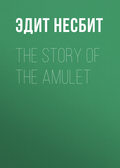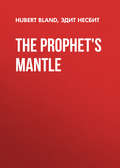
Эдит Несбит
The Wonderful Garden or The Three Cs
CHAPTER VII
BEING DETECTIVES
If you are Jack Delamere, the Boy Detective who can find out all secrets by himself, pretending to be a French count, a young lady from the provinces, or a Lincolnshire labourer with a cold in his head, and in those disguises pass unrecognised by his nearest relations and by those coiners and smugglers to whom in his ordinary clothes he is only too familiar, – if you can so alter your voice that your old school-fellows believe you to be, when dressed for the part, an Italian organ-grinder or a performing bear —
I am sorry, this sentence is too much for me. I give it up. What I was going to say was that persons accustomed to the detective trade, or, on the other hand, persons who are used to keeping out of the way of detectives, no doubt find it easy to play a part and to look innocent when they are guilty, and ignorant when of course all is known to them. But when you are not accustomed to playing a part in a really serious adventure – not just a pretending one – you will find your work cut out for you. This was what Charles and Caroline felt.
It was all very well for Charlotte to have arranged that they should help the Police to look for Rupert, and the other two said cordially that it was very clever of her to have thought of it, and they all started together for the side door where the policeman was still talking to Mrs. Wilmington. But their feet seemed somehow not to want to go that way; they went more and more slowly, and when they were half-way to the house, Caroline said:
‘I don’t think I will. I don’t know how. I should do something silly and give the show away. I shall say I’m too tired.’
‘You are too bad,’ said Charlotte, exasperated. ‘I go and lay all the plans and then you funk.’
‘I don’t,’ said Caroline. And so anxious was she not to have to play the part of pretending to look for Rupert when all the time she knew where he was, that she added humbly, ‘Don’t be snarky. I’m only saying I’m not clever enough. I’m not so clever as you, that’s all.’
I am sorry to say that Charlotte only answered ‘Rats!’ and added, ‘I suppose Charles is going to cry off next?’ She did not think he was: she just said it. And Charles most unexpectedly answered:
‘I think I’d rather not, if you don’t mind.’
Charlotte stamped her foot. ‘Oh, all right!’ she said; ‘but for goodness’ sake come on. They’ll think there’s something up.’ And they walked on.
‘Look here,’ said Caroline suddenly, ‘I will pretend to help. It was only that I was so awfully afraid they’d find him. Only if I disappear, you’ll understand it’s just because I felt sillier than I could bear. You help too, Charles. I’m sure you can – only don’t pretend too much. I shouldn’t talk much except asking questions, if I were you.’
‘Right O!’ said Charlotte.
And Charles said, ‘Oh, well, only if I give it away without meaning to, don’t blame me.’
And by this time they were quite near the house, by whose side door of many-coloured glass the group of talking grown-ups awaited them. Mrs. Wilmington was there with her handkerchief over her head. And William and the gardener’s boy and the gardener, and a tall stout young man with fat red hands who was the Police.
‘I can’t and won’t,’ Mrs. Wilmington was saying. ‘The Master’s orders is – are – that he’s not to be disturbed in the mornings on any pretence – not if the house was on fire. I couldn’t face him with this vulgar tale of runaway boys. I give you leave to search for him,’ she said in proud refined accents. ‘I’m quate competent to take that upon me; quate.’
The Police turned from her to the children, who said ‘Good morning!’ – all but Charlotte, who had said it before.
‘Good morning to you,’ said the Police, ‘and so you young ladies and gents is going to join the search-party?’
‘Yes, please,’ said Caroline.
‘What’ll you do with him if you catch him?’ Caroline asked abruptly.
‘Send him to gaol, in course,’ said the Police, winking at William. ‘An’ you’re all going to help the law in the execution of its duty. And very useful I daresay you’ll be,’ he added affably, ‘knowing the place and what not. Now see here,’ he went on, condescending to them in a way which, it was remarked later, was like his cheek; ‘let’s have a game of play, make-believe, you know. Let’s pretend this runaway lad is a friend of yours’ (a cold shiver ran down three youthful backs; for a moment it seemed that all was discovered, but the Police went on, still playfully) – ‘a friend of yours, and you and him has settled to play a little game of hide-and-seek. And he’s He. Now where,’ he ended, more affably almost than they could bear, – ‘where would you look first?’
‘I don’t know,’ said Charles miserably.
‘Oh! just anywhere,’ said Charlotte.
But Caroline said slowly, ‘I should look in the wood over there,’ and pointed straight to the spot where Rupert lay buried in fern and leaves.
‘Right you are,’ said the Police, delighted to have got a suggestion. ‘Then here goes.’
Charlotte dared not look at her sister lest her face should show her detestation of this traitorous act. Charles put his hands in his pockets to express indifference, and decided not to whistle for fear of overdoing his part. He told himself that he never would have believed it of Caro – never.
And now Caroline was speaking again, looking confidingly up into the large patronising face of the Police.
‘That’s where I should look,’ she was saying, ‘if we were playing hide-and-seek. But as it is – You see we’ve been there all the morning, and he couldn’t have come into the wood without our hearing him, you know. Have you tried the other wood, beyond the garden? And the thatched summer-house? And the lodge that isn’t used? Over by the other gates, you know.’
‘The old lodge,’ the Police echoed. ‘A very likely spot, I shouldn’t wonder. You lead the way, young gentleman,’ he said to Charles.
‘Good old Caro – oh, good old Caro!’ Charlotte was saying to herself as the party started.
‘I’ll dispose my search-party proper later on,’ said the Police importantly, and turned to say, ‘Ain’t you coming, Miss?’ to Caroline, who was stooping down, doing something to her foot.
‘I can’t,’ she said; ‘I’ve got a stone in my shoe. And it hurts,’ she added, standing up firmly on it.
Caroline went indoors, and the search-party threaded the woods and converged at last on the empty lodge. Its lattice-paned windows were dusty, its door hung on a broken hinge, and little black balls of hard moss were dotted between the flagstones of its yard. Its thatch was loose in places, ruffled like the plumage of an old stuffed bird, and its garden had been so long untilled that it had ceased to be the weed-grown earth patch that a neglected garden first becomes, and had grown green all over, covered itself with grass and fern and bramble and baby oak-trees, and become just a fenced-in patch of the wood beyond.
‘Halt!’ said the Police; ‘just the place. I’ll warrant we’ve run the young gentleman to earth this time.’
But they hadn’t. There was nothing in the lodge but an old hamper with a hole in it, a litter of straw and old damp paper, some cold ashes in the grate, and in the upper rooms two last year’s birds’-nests, and a chair with three legs and half a back.
The Police stooped his helmeted head to the low door lintel, and came out into the sunshine a disappointed man.
‘Thought we’d got him,’ he said; and that was what he said at the thatched summer-house and in the larch wood, and at various other parts of the park and grounds where Rupert was not.
‘Isn’t it nearly dinner-time?’ Charles asked, as the search-party pushed through a very brambly brake and came out once more at the back of the deserted lodge.
‘Your kind governess, she put back dinner an hour for you to assist in the search,’ said the Police reassuringly.
‘Best try the other side, Mr. Poad,’ said William; ‘you’ve drawed this blank.’
‘I will now whistle to the gentleman as owns the runaway,’ said the Police suddenly and terribly, and whistled.
‘Where is he?’ Charlotte asked, with a sudden vision of the Murdstone gentleman seeing everything with half an eye, capturing Rupert and carrying him off in half a minute. Charles was wondering ‘what they do to you for helping runaway boys.’
‘Along the road,’ the Police answered, ‘with Mr. Binskin from the Peal of Bells. Keeping watch. I’d best report to him.’
‘Will he come with us?’ Charles could not help asking.
‘I’m of opinion he’s best where he is,’ said the Police. ‘I’m just a-going to tell him to keep on up and down outside. The ostler from the Peal is over the other side, case he gets out that way. Unless he’s had to get back to his work already.’
‘Let’s go and have another look at those birds’-nests while we’re waiting,’ said Charlotte, with great presence of mind. And so it was through the little diamond panes of the lodge that they saw again the Murdstone gentleman, in evening dress and an overcoat, with his tie in a crumpled state under one ear, and his face, as Charlotte said, exactly like the face of a baffled executioner.
He stood talking to the Police for a few moments, with the old familiar scowl that they knew so well. They felt like that about it, though they’d only met the scowler, as you know, on one occasion. Then he went back through the gate, and the children, when they were quite sure that he was gone, rejoined the Police, rather tired, and feeling as though this silly game of looking for what they knew, or at any rate hoped, they weren’t going to find, had been going on for ever, and seemed as though it would never stop.
‘I thought it best,’ the Police explained to William, ‘to keep the gent on the outside of the place. He seems peppery-natured, and if he was to spy his boy among your glass-houses, which is where I propose to conduct my search in next, I wouldn’t answer for it but what he’d leap upon him among the glass like a fox at a duck, and damage untold, as like as not.’
Need I tell you that Rupert was not discovered among the glass?
Less brisk than at its starting, the search-party returned to the side door where the coloured glass was, to be met on its doorstep by Caroline, rather out of breath and very hot. She carried her sun-bonnet by its strings (Aunt Emmeline believed in sun-bonnets and made dozens of them, as presents for all her friends).
‘Well?’ said Caroline.
‘We haven’t found him, Miss, if that’s what you mean,’ said the Police, taking his helmet off and wiping his face. ‘I suppose you ain’t seen anything?’
Caroline looked nervously at the others.
‘I heard something,’ she said, ‘in the wood over there. I went back,’ she went on in a sort of wooden way – and now she was not looking at the others at all – ‘because I left something there; and I heard a rustling sound, and I saw footmarks, in the boggy part of the wood, and I thought it looked like boy’s boots.’
Charlotte said afterwards that she really thought she should have burst into little pieces. And Charles said the same.
To hear their own elder, and till now loved and esteemed sister, quietly betraying the refugee, and to be quite unable to say what they thought of her without having to explain the lack of candour in their own conduct! It was a terrible moment.
‘You don’t say so,’ said the Police, and turned to William. ‘It’s a thirsty job,’ he added carelessly, and William said he’d ask indoors.
A tray with glasses and a jug of something cool resulted. And the Police and William both seemed the better for it. The gardener had retired. It was too far the wrong side of dinner-time for him, he said.
The Police drew a long breath, and wiped his mouth with the back of his hand.
‘Now then,’ he said; ‘you lead the way, Miss.’
Caroline led. The others followed. They could hardly bear to go, yet they could still less bear to be left behind. Across the hot sunny grass they went and into the wood. Even that, though shady, was hot, and there seemed to be more flies than could possibly be needed for any useful purpose. Caroline, still carefully avoiding the eyes of the others, led the way straight to the ferny lair where they had left Rupert, the others following in helpless fury.
‘Hullo!’ said the Police, ‘this looks something like.’
For there the lair was – plainly to be seen – a lair and nothing else, but a lair that was deserted.
‘I think we’re on to him now,’ said the Police; ‘which way did you say them footstepses was, Missie?’
‘Farther on,’ said Caroline. ‘I tied my handkerchief to a tree to mark the place.’
‘You never!’ said the Police admiringly; ‘why, you deserve to be in the Force, Miss. It’s not every constable, even, would have thought of that.’
And I believe he spoke the truth.
Following Caroline and the Police, pushing miserably through the bushes that sprang back as the others passed through and tried to hit them in the face, Charlotte and Charles exchanged glances full of meaning.
The whole party made a good deal of noise: there was the rustling of leaves, both the green and the dead kind; the snapping of twigs underfoot; the grating of bough against bough as the searchers pushed through the hazels and sweet chestnuts and young oaks.
‘You’d do fine for keepers,’ said William, coming last. ‘No poachers wouldn’t never hear you a-coming.’
‘That your handkerchief, Miss?’ the Police at the same moment asked smartly, and pointed to a white thing that drooped from a dog-wood branch; ‘you identify the handkerchief?’
‘Yes,’ said Caroline in a stifled voice, ‘and there’ – she pointed down.
There were footprints, very plain and deeply-marked footprints, not very large, yet not small like a girl’s. They were the footprints, beyond any doubt, of a boy.
‘Now we’ve got him,’ said the Police for about the fifteenth time that morning, and proceeded to follow the steps, as was remarked later, like any old sleuth-hound.
William said, ‘Remarkable deep for the time of year,’ but nobody took any notice of him. The boot-boy took a pleasure in planting his own steps beside the tracks they were following, till the Police admonished him.
‘Them tracks is evidence,’ he said; ‘you needn’t tread so nigh them.’
The tracks led them down a steep place, a sort of gorge, and ended at the tall oak fence.
‘He must have escaped this way,’ said the Police.
‘I’ll take my Sunday Sam he never,’ said William.
‘There’s another footprint here,’ said Caroline anxiously.
‘So there be,’ said the Police. ‘You ’ave been a ’elp, Miss. I shall name you in my report.’
It was now seen that a further line of footprints led along the fence to a place where a pale was loose.
‘This is where he got through, you may depend,’ said the Police.
‘I’ll easy wrench another pale loose, if you want to follow on,’ said William, and as he did so Charlotte saw him wink, distinctly wink at Caroline. How hateful everybody was! Oh, poor Rupert!
Every one got through, Charles and Charlotte rather doubtfully looking up and down the road first to see if the Murdstone master was in sight. ‘Which way?’ the Police now asked himself and the others anxiously.
That was quickly settled. A whitish object lying in the middle of the road ten yards away, beckoned them to the right. The Police stooped stiffly, picked it up and examined its corners.
‘Rupert Wix,’ he read solemnly. ‘I shall now sound my whistle and acquaint the gentleman as owns the boy with our discovery of the ankercher belonging to the runaway.’
But Caroline laid a hand on his arm and arrested the whistle on its way to his lips.
‘Isn’t that something else white, farther along?’ she said.
‘Don’t tell me ’e got two ankerchers,’ said William; ‘no boy was ever bred as ’ad two ankerchers at the one time.’
‘I don’t see nothing,’ said the Police, but he walked in the direction of Caroline’s gaze.
‘It’s wonderful what eyes you’ve a-got, Miss,’ said William; ‘none of the rest of us didn’t spy it.’
Charlotte and Charles walked apart from Caroline in a marked manner.
There certainly was something white in the road – a piece of paper with a stone on it, and also, as the Police saw when he picked it up, writing, pencilled, with that kind of black blunt pencilledness which happens when you have a pencil whose point has seen better days, and you encourage its efforts with your tongue.
‘To any kind Bypasser,’ the Police read out, ‘please put the inside in the post for me.’
The paper on which this was written was a leaf torn from a note-book and folded across. Inside was another leaf with a stamp in the corner, as though it had been a post-card. On one side was an address, ‘Mr. and Mrs. Wix, The Nest, Simla, India,’ and on the other these lines which the Police read out:
Dear Parents – I am running away to sea through being so ill-treated by Macpherson. I will write from the first port. I shall get a ship at Hastings, I expect. – Your affecate son,
Rupert.
‘Well!’ said the Police; ‘if that don’t beat all! Lucky we saw this.’
‘Yes, ain’t it,’ said William, ‘and this the Hastings road and all. You ought to catch up easy if you start right away now.’
‘I shall now blow my whistle,’ said the Police as usual, ‘and acquaint the boy’s guardian with our discovery.’
‘If we can’t be any more use,’ said Caroline hastily, ‘perhaps you wouldn’t mind our going back to our dinners. They’ll be getting dreadfully cold for the time of year,’ she added a little wildly.
‘Best go back through the gap,’ said William. ‘It ought to be mended, though. Here, you,’ he said to the gardener’s boy, ‘go round by the lodge and tell Peters to get it seen to.’
‘There is no need to detain you,’ said the Police, ‘and thanking you for your assistance, which shall be mentioned in my report. Good morning to you.’ He blew his whistle and they hastened back through the gap.
Once through it the others refused to meet Caroline’s eye. But she did not seem to notice it.
‘I know listening’s wrong,’ she said; ‘but when you’re playing detectives the rules are different, and I should like – ’
‘Slip along by the pale, Miss,’ said William. ‘“All’s fair in love an’ war,” as the saying is.’
She slipped, and the others could not help following her. William went too.
The boots of the Murdstone tutor were now heard on the road. Then came the voice of the Police, explaining how clever he had been in finding the footsteps, the handkerchief, and the letter. ‘And you’d best read the letter,’ the Police added.
A brief letter-reading silence was broken by the Murdstone man, very angry indeed.
‘Monstrous!’ he said; ‘and left in the public road for any stranger to see! Monstrous! There’s not a word of truth in it.’
‘You can tell that to the Magistrate,’ said the Police. ‘Beg pardon, sir, I mean I think I’ve cleared up this little difficulty for you.’
‘I suppose I can get a trap in the village?’ the Murdstone man asked.
‘At the Green Dragon, sir.’
‘Right,’ said Mr. Macpherson smartly. ‘Good morning!’ And he turned and walked quickly away, leaving the Police planted there, as they say in France.
‘Well – I’m – dished!’ said the Police aloud, after a moment’s silence, to what he supposed to be solitude; ‘not so much as tuppence to drink his blooming bad health in. The stingy blighter! He can look for his own boys after this. And I hope the young ’un gets off, so I do.’
‘Same here,’ whispered William behind the grey oak paling.
The Police walked heavily away.
‘Best go in to dinner,’ said William, and the four walked in silence across the park. When they got to the side door William spoke.
‘You’re a fair masterpiece, Miss Caroline,’ he said; ‘that I will say.’
‘Thank you,’ said Caroline.
Charles and Charlotte both felt – they owned it afterwards – almost choked by all the things they wanted to say to Caroline and couldn’t, because of William. They drew long breaths and almost snorted with mixed emotions.
‘I say,’ said Caroline eagerly, as William turned away. But Charles interrupted.
‘We don’t mean to speak to you,’ he said.
And just then Mrs. Wilmington appeared at the door, and no one could say anything further; anything that mattered, that is.
She escorted the girls to their room. In her superior lady-like way she was curious about the missing boy. Charlotte told the story briefly, while Caroline buried her hot face in a big basin of cold water and blew like a grampus. Then there was dinner, and Mrs. Wilmington stayed all through that to hear more details. When dinner was over Caroline disappeared.
‘I expect she’s gone away to cry,’ Charlotte whispered to her brother. ‘I say, I wish we hadn’t. But we did agree we oughtn’t to speak to a traitor till it was sorry: you said so yourself in the wood.’
‘It’s all very beastly,’ said Charles. ‘I wish it hadn’t happened, upsetting everything.’
‘I say,’ Charlotte said, ‘let’s forgive her now. I expect she thought she was doing right, being like a Spartan boy or something. Caro is silly like that sometimes. Let’s go and find her and forgive her, and talk it all over comfortably, the three of us.’
‘I don’t mind,’ said Charles; ‘let’s find her, if you like.’
But they couldn’t find her.







